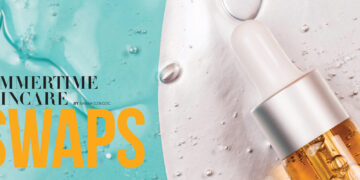The question over whether or not our food choices affect skin health has been debated for as long as the adage “you are what you eat” has been around. But how much can we count on nutrition to treat acne, eczema, and fine lines? To clear up the facts on clearing up our skin we spoke with Vancouver-based registered dietitian Jess Pirnak and dermatologist Dr. Benjamin Barankin of the Toronto Dermatology Centre.
The Internet provides thousands of stories of people who claim to have solved their skin problems by adopting a certain diet or eliminating specific foods. And we tend to see these online anecdotes as more than just hearsay: A2016 study found that 92percent of patients believed diet could affect acne and71 percent believed it to be caused by greasy or fried food. But is there any truth to this? As these supposed clean-skin diets perpetrated by strangers and celebrities alike abound, researchers and health professionals take a closer look at the ways in which our food choices affect our skin’s health. And as it turns out, beauty is quite literally a lot more than skin-deep.
WORD TO THE WISE
Before you trade your serums for spirulina, it’s important to consider everybody and everybody is different. Dr. Barankin cautions against simply eating or omitting one particular food type. “What is safe to assume is that certain foods may affect one person’s skin more acutely than another’s and nutrient-rich diets with an emphasis on vitamin and antioxidants are a safe bet, whether dealing with acne prevention, anti-aging, or both.”Pirnak tends to agree: “Eating well definitely plays a part in healthy skin and there are key nutrients that can help with that, but I don’t think diet alone would be the only plan of attack if you were looking to cure a skin issue.”
ACNE & ECZEMA
Pizza isn’t to blame for your new zit; well, not entirely. Though the main factors of acne are not food-related but rather due to hormones, bacteria, blocked pores, and inflammation among other causes, this isn’t to say diet has no place in dermatology. “A lot of eczema and acne could come from inflammation and a dysbiosis in the gut,” says Pirnak. “You’ll always have both good and bad bacteria in your gut. But when the good bacteria are outnumbered your body tries to get rid of the excess inflammation, which could appear like acne, eczema, or that random rash you can’t explain.” Though it’s no blanket solution, some people may find their skin issues resolve in part by abstaining from inflammatory triggers(excess salt, refined sugar, highly processed foods, and certain oils, namely canola and sunflower oil) and feeding the good bacteria with the soluble fiber found in oats, nuts, and seeds. Inputting the pimple-pizza theory to rest Pirnak explains, “It’s more likely the bacteria from touching greasy food like pizza then touching your face afterward than the food itself. However, if you’re constantly eating this kind of highly processed food then it could go back to that gut issue.”
AGING & SUN DAMAGE
Aging is a complex process involving environmental factors, genetics, and also natural processes like a reduction in collagen production, but certain foods can help offset and even repair age-related skin concerns. “If you are starting to see the ramifications from past sun exposure, vitamins A, C, and E can help to repair the damage,” says Pirnak. Avocados and walnuts are rich in both vitamin C and E, and they work by protecting against oxidative damage. Vitamin C has the added bonus of being a vital part of synthesizing collagen, the protein that provides strength and structure to skin and connective tissue. Though sunscreen is always necessary, beta-carotene—think carrots, sweet potatoes, dark leafy greens—helps protect against the sun’s rays in addition to improving skin tone and overall glow.

DRYNESS
If lotion alone isn’t cutting it, omega fatty acids are superb for treating dry skin.“ The EPA and DHA found in Omega 3-rich foods such as salmon and hemp hearts really reduce the overall dryness and inflammation,” explains Pirnak. This can certainly help with the dry flakes we get, but it’s just as important to deal with overall dehydration, too. “When we wake up, our bodies are naturally dehydrated and we tend to reach for drinks like coffee that further deplete our body’s hydration,” says Pirnak.“I would not overestimate the power of H2Oandgetting more throughout the day—drink water first thing in the morning or eat more melons, which are not only mostly water but also contain those important antioxidants for skin health.” Finally, isoflavones can affect the look and feel of our skin. “Isoflavones found in soybeans, edamame, and tofu can improve dryness in addition to increased collagen and elastin production,” says Dr. Barankin.
FINAL THOUGHTS
Dietitians and dermatologists agree that an overall balanced lifestyle can be a helpful adjunct to dealing with common skin concerns. Pirnak reminds us that the best diet for supple skin is no secret: “It’s really one that limits inflammatory foods while emphasizing fruits, vegetables, adequate protein, and whole foods over refined ones.” So if the following keto did wonders for your coworker, or your friend swears by being dairy-free, it’s important to remember that what works for one person may not be a fit for another. For most people, good old-fashioned balance is the key to healthy skin...

















